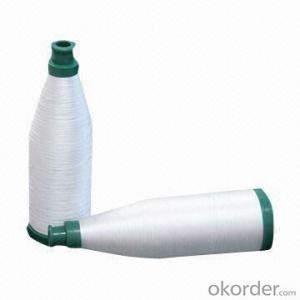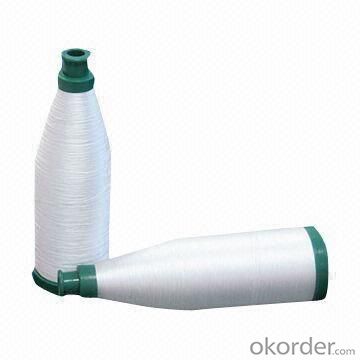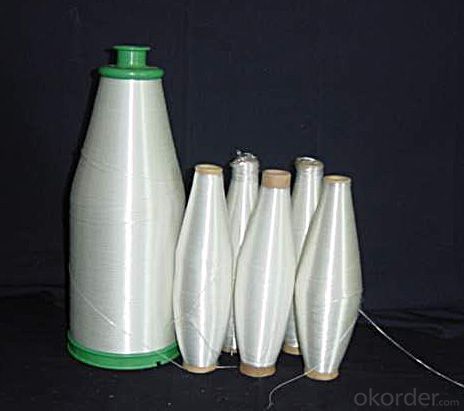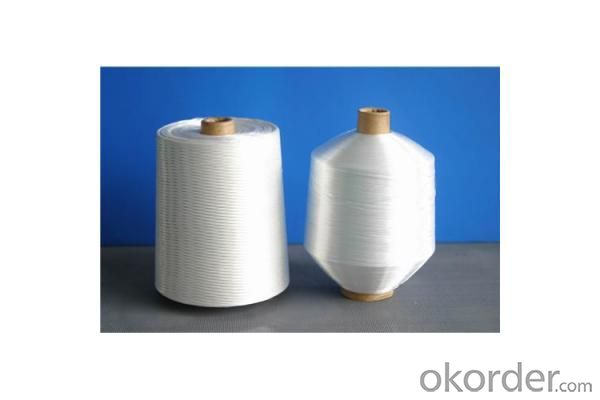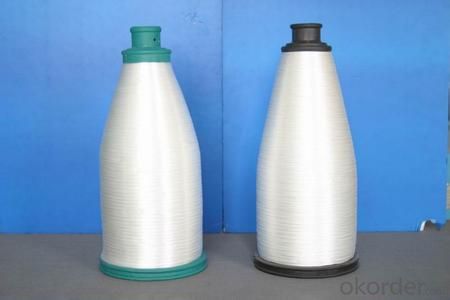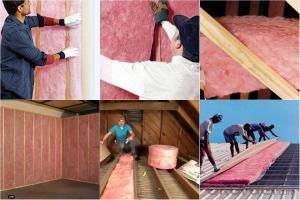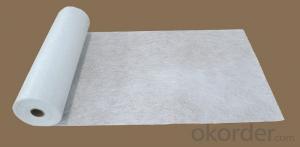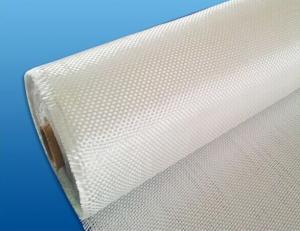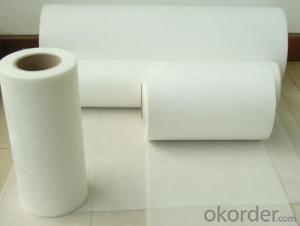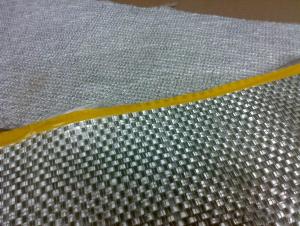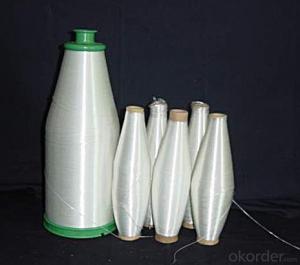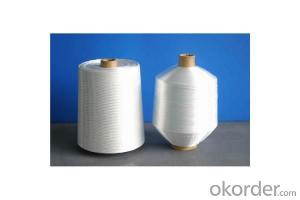Fiberglass Mat Tissue Yarns for All Kinds of Usages
- Loading Port:
- China Main Port
- Payment Terms:
- TT or LC
- Min Order Qty:
- 20000kg kg
- Supply Capability:
- 200000kg Per Month kg/month
OKorder Service Pledge
OKorder Financial Service
You Might Also Like
1.Brief Introduction
C-or E-textile glass a kind of additional twisting and plying yam. With the characteristics of high strength, corrosion resistance, heat resistance and high moisture absorption, no-alkali yam has high electric insulation, so it used to produce weaved wires and cables’ wrap cladding, protection sleeve, train of mine, insulation materials of electric machinery, every yam of woven cloth and other industrial yam. It can also supply big and little paper cube and other cube yams with different shapes and different roll weight.
2.Characteristics
Good Dispersibility.
Less fuzzy.
Density Even
3.Product Specifications
Product Code | Tex | diameter (um) | Sizing. | breaking strength | Twist |
CC7.5-22-1/2 110S | 44 | 7.5 | paraffin | ≥15.5 | 110±10 |
EC9-33-1/2 65S | 66 | 9 | ≥24.1 | 65±5 | |
EC8-25-1/2 65S | 50 | 8 | ≥19.2 | 65±5 | |
CC9-33-1/2 65S | 33 | 9 | ≥20.6 | 65±5 | |
CC11-44-6/0 | 264 | 11 | ≥81.6 | ||
CC11-44-1/3 110S | 132 | 11 | silane | ≥40.8 | 28±3 |
EC9-68-1/0 28Z | 68 | 9 | ≥18.0 | 28±3 |
Special specification can be produce according to customer requirements.
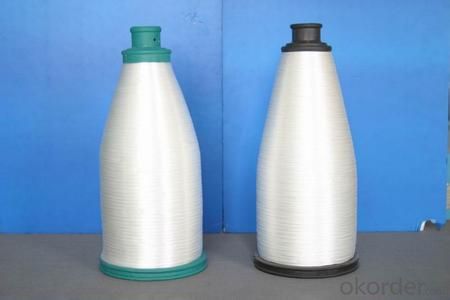
4.FAQ
a.Storage:
Unless otherwise specified,It should be stored in a dry, cool and rain-proof area. It is recommended that the room temperature and humidity should be always maintained at 15℃~35℃ and 35%~65% respectively.
- Q: Can fiberglass mat tissue be used for flooring insulation?
- No, fiberglass mat tissue is not typically used for flooring insulation. Fiberglass mat tissue is a lightweight material often used in the construction industry for applications such as reinforcing plaster and concrete, as well as for insulation in walls and ceilings. However, when it comes to flooring insulation, other materials such as foam boards or batt insulation are more commonly used. These materials provide better thermal and sound insulation properties specifically designed for flooring applications. Additionally, foam boards and batt insulation are easier to install and are better suited to withstand the pressures and demands of foot traffic on the flooring.
- Q: Is fiberglass mat tissue suitable for marine repairs?
- Fiberglass mat tissue is indeed suitable for marine repairs. With its exceptional strength and durability, this versatile material is perfect for fixing and reinforcing different marine structures and components. Notably, fiberglass mat tissue is renowned for its ability to resist water, chemicals, and corrosion, making it indispensable in the marine environment. By utilizing it, hulls, decks, bulkheads, and other boat and ship parts can be repaired, ensuring structural integrity and preventing further harm. Furthermore, applying fiberglass mat tissue is a breeze, as it can be done through various methods like wet lay-up or vacuum bagging. It is no wonder why it is a popular choice for marine repairs.
- Q: What is the typical width of fiberglass mat tissue rolls?
- The typical width of fiberglass mat tissue rolls can vary depending on the specific manufacturer and intended application. However, in the construction and insulation industries, fiberglass mat tissue rolls are commonly available in widths ranging from 1.22 meters (4 feet) to 2.44 meters (8 feet). These dimensions are often chosen to align with standard building materials and construction practices. It is important to note that there may be variations in width options depending on the region or supplier, so it is advisable to consult with the manufacturer or supplier for the specific width requirements for a particular project.
- Q: What is the typical thickness of fiberglass mat tissue?
- The specific application and intended use determine the typical thickness of fiberglass mat tissue, which can vary. Usually, it is accessible in thicknesses ranging from 0.5mm to 3mm. The selection of thickness depends on factors like the desired strength, flexibility, and absorption properties necessary for the manufacturing of the specific project or product. Applications needing greater levels of strength and durability generally employ thicker fiberglass mat tissue, whereas thinner tissue is appropriate for lightweight and flexible applications.
- Q: Is fiberglass mat tissue compatible with different resin systems?
- Fiberglass mat tissue is indeed compatible with different resin systems. This versatile material can be utilized with a variety of resin systems, such as polyester, epoxy, and vinyl ester resins. Its exceptional wet-out properties enable the resin to be absorbed and distributed evenly throughout the mat. Consequently, this compatibility facilitates the fabrication of robust and long-lasting composite structures for numerous industries, including automotive, marine, construction, and aerospace. Nevertheless, it is crucial to carefully assess the unique properties and characteristics of the resin system employed to guarantee optimal performance and compatibility with the fiberglass mat tissue.
- Q: What is the fire rating of fiberglass mat tissue?
- The fire rating of fiberglass mat tissue differs based on its specific composition and the standards it has been tested against. Typically, fiberglass mat tissue is engineered to possess fire-resistant qualities, but the actual fire rating relies on variables like the tissue's thickness and any supplementary fire retardant coatings or treatments. To ascertain the fire rating of a particular fiberglass mat tissue product, it is advisable to refer to the manufacturer's specifications or test reports, as they offer the most precise and current information available.
- Q: Can fiberglass mat tissue be used for composite tooling?
- Yes, fiberglass mat tissue can be used for composite tooling. Fiberglass mat tissue is a lightweight material made of randomly oriented fiberglass strands bonded together with a resin binder. It is commonly used as a reinforcement material in composite applications such as boat building, automotive parts, and aerospace structures. When used for composite tooling, fiberglass mat tissue can provide strength and stiffness to the tooling structure. It can be layered and impregnated with resin to form a solid and durable composite tool. The resin binder in the mat tissue helps to hold the fibers together and provide resistance against wear and tear. Fiberglass mat tissue is also flexible and can be easily molded into complex shapes, making it suitable for creating tooling with intricate designs. It can be easily cut and shaped to match the desired tooling dimensions. However, it is important to note that fiberglass mat tissue alone may not be sufficient for all types of tooling applications. Depending on the specific requirements of the tool, additional reinforcement materials such as carbon fiber or Kevlar may need to be added to enhance the strength and durability. Overall, fiberglass mat tissue can be a cost-effective and practical choice for composite tooling, providing strength, flexibility, and ease of use.
- Q: Can fiberglass mat tissue be used for insulating ductwork?
- Indeed, insulating ductwork can be accomplished by employing fiberglass mat tissue. This insulation material is characterized by its composition of delicate glass fibers. Its lightweight and pliable nature facilitate effortless installation around ductwork, ensuring optimal thermal insulation. The outstanding insulating qualities of fiberglass mat tissue serve to minimize heat loss or gain within ducts, effectively enhancing energy efficiency. Additionally, it aids in condensation reduction and noise attenuation. Furthermore, its resistance to moisture, fire, and pests renders fiberglass mat tissue a fitting option for insulating ductwork in diverse environments.
- Q: Can fiberglass mat tissue be used for insulation in research laboratories?
- Yes, fiberglass mat tissue can be used for insulation in research laboratories. It is a common material choice due to its excellent thermal insulation properties and fire resistance. Additionally, fiberglass mat tissue is lightweight, durable, and easy to install, making it suitable for various insulation applications in laboratories.
- Q: Can fiberglass mat tissue be used in marine applications?
- Yes, fiberglass mat tissue can be used in marine applications. Fiberglass mat tissue is a lightweight and flexible material that is commonly used in boat building and repair. It provides excellent strength and durability, making it suitable for marine environments where the material is exposed to water, salt, and other harsh conditions. Fiberglass mat tissue is often used as a reinforcement layer in the construction of boat hulls, decks, and other structural components. It helps to add strength and stiffness to the composite materials used in marine applications, enhancing their overall performance and longevity. Additionally, fiberglass mat tissue is resistant to corrosion and has good water resistance properties, making it well-suited for marine applications.
Send your message to us
Fiberglass Mat Tissue Yarns for All Kinds of Usages
- Loading Port:
- China Main Port
- Payment Terms:
- TT or LC
- Min Order Qty:
- 20000kg kg
- Supply Capability:
- 200000kg Per Month kg/month
OKorder Service Pledge
OKorder Financial Service
Similar products
Hot products
Hot Searches
Related keywords
